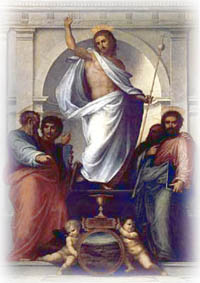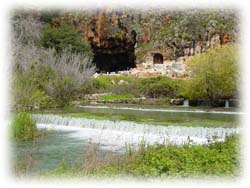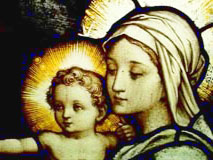It's Christmastime. All the festivities have made the world freshly aware of the momentous occurrence two millennia ago: Immanuel--God with us--is born! God Himself took the humble form of a servant in order to save men from their sins. Not everybody accepts this premise; but even those people recognize that the birth of that baby in a lowly stable changed and impacted the entire world in a profound way. Though some may try to take Christ out of Christmas, it can't be done. His birth--and the life, death and resurrection that followed--is the very foundation of this celebration that touches every tribe and nation on earth.

The scriptures tell us Jesus was born for a specific purpose. He was born to live and die for His people: to reconcile us to God and to build us--His church--into a holy nation, a kingdom of priests, that will honor and glorify Almighty God forever. Those who are alive in Christ celebrate His birth because of the wonderful and mighty things He has done.
The LDS Church holds a different viewpoint about Christ and what He has done. It teaches that one aspect of the very work Jesus left His throne in heaven to accomplish was quickly overthrown by wicked men; in the task of building His church, Jesus failed. This is Mormonism's Great Apostasy doctrine.
According to Mormonism, Jesus put His Apostles in charge of advancing His kingdom; but after they died, there was a hostile takeover of the infant church by wicked men who perverted the Gospel and changed the scriptures. God removed His authority from the earth because of this rebellion, and the true church of God ceased to exist. That is, it was absent from the earth until it was restored through Joseph Smith in the nineteenth century.
An LDS Church pamphlet says, "As Latter-day Saints, we testify that shortly after the death of the Lord's original twelve apostles, there came seventeen hundred years of apostasy and darkness. Then, in 1820, the resurrected Savior appeared to Joseph Smith and called him to be a prophet to all the world. Through him came the restoration of the priesthood, the gospel, and the true church: The Church of Jesus Christ of Latter-day Saints."1
This apostasy and restoration are foundational to the LDS Church; for, if it didn't happen, there would be no reason for Mormonism to exist. LDS Authority B. H. Roberts wrote, "Nothing less than a complete apostasy from the Christian religion would warrant the establishment of the Church of Jesus Christ of Latter-day Saints. Of sects there were already enough in existence...there was no possible excuse for the introduction of a new Christian sect. But if men through apostasy had corrupted the Christian religion and lost divine authority to administer the ordinances of the Gospel, it was of the utmost importance that a New Dispensation of the true Christian religion should be given to the world."2
It is likely that Mormons today would not be comfortable admitting that the LDS apostasy doctrine suggests a failure on the part of Jesus. Joseph Smith, however, had no qualms about it. A few short weeks before his death in 1844, this founding Prophet of Mormonism said, "I have more to boast of than ever any man had. I am the only man that has ever been able to keep a whole church together since the days of Adam. A large majority of the whole have stood by me. Neither Paul, John, Peter, nor Jesus ever did it. I boast that no man ever did such a work as I. The followers of Jesus ran away from Him; but the Latter-day Saints never ran away from me yet.3
Could a true prophet of God speak such words as these? I cannot believe it. But of even greater concern is what this "prophetic proclamation"--and the LDS doctrine of complete apostasy--imply about the Lord Jesus Christ.
When Jesus brought His disciples to the region of Caesarea Philippi, He asked them what people thought of Him.4 The disciples answered, saying some thought Jesus was Elijah, some thought He was Jeremiah, and still others thought He was one of the prophets. Jesus then asked this crucial question: "But who do you say that I am?" Peter made an amazing declaration: "You are the Christ, the Son of the living God."

In response to Peter's confession of faith Jesus said, "Blessed are you, Simon Bar-Jonah, for flesh and blood has not revealed this to you, but My Father who is in heaven. And I also say to you that you are Peter, and on this rock I will build My church, and the gates of Hades shall not prevail against it."
The New Testament portrays Jesus as a cornerstone and foundation; he who builds on Christ "shall not be put to shame."5 Earlier in Matthew, in His Sermon on the Mount, Jesus used the rock foundation in a metaphor of persevering faith: "...and the rain descended, the floods came, and the winds blew and beat on that house; and it did not fall, for it was founded on the rock."6
So, in preparing His disciples to carry on His kingdom work, Jesus Christ, the Son of the living God, promised them He would build His church. Because it would be built on the rock-solid foundation of Christ Himself, nothing would ever be able to stop it or overcome it.7
Except (according to the Mormon view) wicked and rebellious men.
How can this be? An LDS publication explains, "The realization that the Lord's true church was not only vulnerable, but destructible, comes as a shock to many people. But if wicked men were able to put to death the Messiah himself, is it so strange that they should also have the power to destroy his church?"8
Perhaps it would not be so strange if wicked men had had the power to put Jesus to death. But they had not. Jesus Himself said, "Therefore my Father loves Me, because I lay down My life that I might take it again. No one takes it from Me, but I lay it down of Myself. I have power to lay it down, and I have power to take it again."9 All throughout the New Testament this truth is proclaimed.10 Jesus had complete power over His life--and over the men who sought to end it.11
Some might agree, yet suggest it was God's will that Christ's church should fail and the Gospel be taken from the earth. Certainly, if God chose this course for history it would have been so. However, if God chose this course for history He would not have proclaimed that He would build His church and the gates of Hell would not prevail against it. He would have told us, if anything, that the church Jesus built was temporary, but not to worry; He had a plan.
The LDS Church, of course, teaches that Jesus did tell us this. Pointing to the many scriptural warnings against heresy, false teachers, and false prophets, Mormon leaders assert their conclusion that the Christian church was completely overcome; God removed all spiritual authority and Gospel truth from the earth, which made salvation impossible during seventeen hundred years of the darkest of ages.12 But this is not what scripture says.
The New Testament speaks often about apostasy--there is no dispute about this. There were heresies troubling the infant church. There were false teachers leading people astray. There were people turning away from the truth in willful rebellion--then as now. But Christ's church is not destroyed by these trials; it has a firm Foundation and an indestructible Cornerstone. Yes, the New Testament warns of apostasy, but it fairly shouts of victory!
For instance, Jude's epistle was written to confront and denounce false teachers who had become a serious threat in the church. Jude begins his letter exhorting believers to "contend earnestly" for the truths contained in the Gospel message. This faith, he says, has been "once for all delivered to the saints." This in itself is a proclamation of the perpetual presence of the Gospel on earth. Yet continuing, Jude warns that ungodly men were perverting the Gospel message and drawing people into sin, but the church was to remain steadfast by remembering "the words which were spoken before by the apostles" warning of "mockers in the last time." Jude tells them, "But you, beloved, building yourselves up on your most holy faith, praying in the Holy Spirit, keep yourselves in the love of God, looking for the mercy of our Lord Jesus Christ unto eternal life." In closing, Jude blesses the church with an inspired doxology encouraging them with a declaration of God's power to preserve His people to the end: "Now to Him who is able to keep you from stumbling, and to present you faultless before the presence of His glory with exceeding joy..."
Jude is not an exception to the rule. The teachings of Jesus and the writings of the apostles include many warnings; they also consistently proclaim the absolute power and faithfulness of God to protect and preserve what belongs to Him.13

Mormonism needs to convince people that Christ's church was overcome and destroyed; for if it was not, the LDS Church is unnecessary. However, in attempting to do away with the promised preservation of the church Jesus continues to build, Mormonism has stepped into the abyss. The doctrine of the Great Apostasy does not merely cast aspersions on Christians and Christianity, but maligns the character and attributes of God Himself.
As we contemplate the baby in the manger, we must not be fooled by His infant helplessness. Jesus was born a King. Let us sing with David, "The earth is the LORD'S, and all its fullness, the world and all who dwell therein. For He has founded it upon the seas, and established it upon the waters. ...Lift up your heads, O you gates! And be lifted up, you everlasting doors! And the King of glory shall come in. Who is this King of glory? The LORD strong and mighty, the LORD mighty in battle. ...The LORD of hosts, He is the King of glory."14